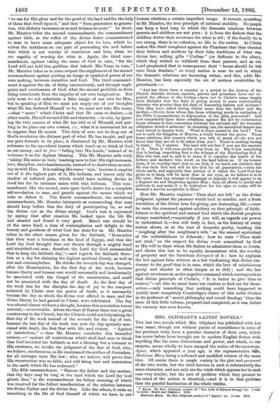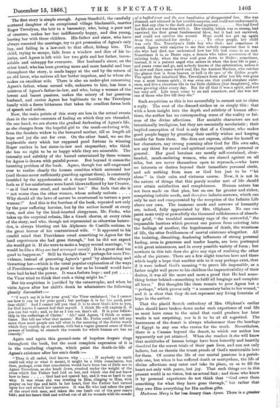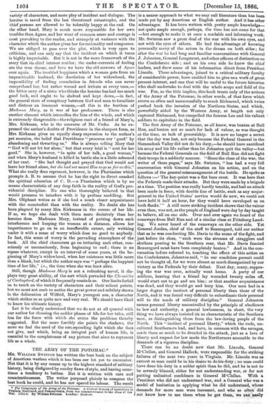MRS. OLIPHANT'S LATEST NOVELS.*
THE last two novels which Mrs. Oliphant has published with her own name, though not without points of resemblance to some of her previous tales, have a peculiar character of their own, which has never before been brought out in modern English fiction with. anything like the same distinctness and power, and which, to our surprise, seems wholly to have escaped the notice of the reviewers. Agnes, which appeared a year ago, is the representative tile, Madonna Mary being a softened and modified version of the same idea. Of course there is ample variety in the plot and personnel of the two works, but the chief heroine in each is substantially the same character, and not only are the trials which oppress her in each case very similar, but the sort of problem which they present to the mind of the author is identical,—and it is in that problem that the painful fascination of the whole resides.
• Agnes. By Mrs. Oliphant, author of "The Life of Edwaid Irving," Jte. 3 eels London : Hurst and Bleakest. 1868.
Madonna Mary. By Mrs. Oliphant, author of" Agnes," &o. 3 vols. 1886.
The first story is simple enough. Agnes Stanfield, the carefully nurtured daughter of an exceptional village blacksmith, marries Roger Trevelyan, the heir to a baronetcy, who, being a poor sort of creature, makes her but indifferently happy, and dies young, leaving her with three children. His father and sister, who have always resented the marriage, try to get possession of Agnes's only boy, and failing in a law-suit to that effect, kidnap him. The child, trying to escape, falls from a window and dies of his in- juries, and Agnes is left with her two girls and her father, incon- solable and unhappy for evermore. Her husband's sister, on the other hand, who has been growing more and more hateful and base throughout the story, is made happy at the end by the return of an old lover, who revives all her better impulses, and to whom she makes an excellent wife. There is also an under-plot concerning Agnes's father, whose second wife, unknown to him, has been a mistress of Agnes's father-in-law, and who, being a woman of the lowest and basest passions, makes the misery of her generous husband, and envies Agnes her legitimate tie to the Trevelyan family with a fierce bitterness that takes the cruellest forms both of speech and action.
Now, the main points of this story are less in the actual events
than in the under-currents of feeling on which they are threaded. On one hand, we are shown the gradual darkening of Agnes's life. as she changes from the hopeful girl to the much-enduring wife; from the desolate widow to the bereaved mother, till at length all hope and joy die out for ever. On the other hand, we see the implacable envy which her supposed good fortune in winning Roger excites in her sister-in-law and stepmother, who think she has no right to be so happy while they are miserable. The intensity and subtlety of the hatred entertained by these women for Agnes is drawn with painful power. But beyond it comes the haunting problem of the book. Agnes, though too self-engrossed ever to realize clearly the human enmities which surround her (and thence never sufficiently guarding against them), is constantly troubled by the apprehension of a deeper hostility. She always feels as if her misfortunes were harsh blows inflicted by her Creator, "as if God were cruel, and mocked her." She feels that she is "not worse than the other women, whom nobody molests . . . . Why should all the laws of nature be overturned to torture a poor woman ?" And this is the burthen of the book, repeated not only by the poor suffering heroine, but by the author herself at every turn, and also by the kind-hearted clergyman, Mr. Freke, who takes up the sceptical refrain, like a Greek chorus, at every crisis of the story, and who, though not represented as otherwise hetero- dox, is always blurting out his Alphonse de Castille notions, to the great horror of his conventional wife. " It appeared to his candid mind that Providence owed something to Agnes for the hard experiences she had gone through," but he did not expect she would get it. If she were to make a happy second marriage, "it would be like a thing one had arranged oneself. It is a great deal too good to happen so." Still he thought that "perhaps for once Pro- vidence, instead of procuring Agnes's ' good ' by abandoning and thwarting her—which is the usual popular explanation of the ways of Providence—might be as good to her as he himself would have been had he had the power. It was a forlorn hope ; and yet . . . . the Vicar tried to think that such a thing might be."
But his scepticism is justified by the catastrophe, and when he visits Agnes after her child's death he administers the following ghostly discomfort :—
" I won't say it is for your good,' the Vicar exolaimed, for I cannot see how it can be for your good ; but perhaps it is for his good, poor dear child ! And I cannot tell you that it is to show God's love to you, for God knows I cannot feel that myself. I think He will explain it, if you can but wait ; and, so far as I can see, that's all. It is your fellow- ship in the sufferings of Christ.' 'Ah !' said Agnes, think so some- times. But tell me what that means.' But Mr. Freke could not tell any more than most people can tell what is the meaning of the divine words which they snatch up at random, with but a vague general sense of their powers of healing, to staunch the wounds for which human art has no remedy."
Again and again this ground-note of hopeless despair rings throughout the book, but the most complete expression of it is in the concluding chapters, which paint the death-in-life of Agnes's existence after her son's death :—
" Thus it all ended, God knows why If anybody on earth could tell why or what it meant, it might be a little consolation, but then, perhaps' even that consolation would have been but of little use to Agnes Trevelyan' as she knelt down, crushed under the weight of the cross which her Father had laid on her, and which she did not know how to bear God had not spared her, and it was so hard to see why. It was when she was trusting in Him, clinging to Him, with prayer on her lips and faith in her heart, that the Father had turned upon her and struck her unawares. It was He who had taken the part of the cruel rich man, and taken the one lamb out of the poor man's fold; and herkeart bled and sobbed out of all its wounds with the wonder of a baffled trust and the sore humiliation of disappointed love. She was stunned and silenced in her terrible surprise, and could not understand it, nor find any clue to the dark and dread mystery She had lived her life out, and was done with it. Her vitality, which was so strong, had survived the first great fundamental blow, but it had not survived, and could not survive the second. Hope could not get up again
from that unlocked-for stroke To other people, her child was only Mrs. Trevelyan's little boy who died ; and sometimes it
struck Agnes with surprise to see that nobody suspected that it was she who had died, nor understood how her life had come to an end.
Sometimes it is, as Dante says, a demon who takes possession of the existing body, when the true soul goes down to Hades ; sometimes, instead, it is a patient angel who enters in when the dear life is past ; and years come and go, and nobody knows of the substitution, unless it be now and then some weird soul, like the Ancient Mariner, who catches the glance that is from heaven or hell in the eyes of the lifeless people. The spirit that inhabited Mrs. Trevelyan's form after her life was gone was a most human spirit ; it was oven one that could simulate exist- ence, and live a vicarious life in the little children [her daughters], who were growing older every day. But for all that it was a spirit, and not her very self. Life must come to an end somehow, and she was not one of those who live till they die."
Such scepticism as this is too mournfully in earnest not to claim a reply. The root of the discord strikes us as simply this : that with a keen insight into the depth and subtlety of human affec- tions, the author has no corresponding sense of the reality or ful- ness of the divine affections. Her amiable characters are not intentionally irreligious, but they are essentially secularistic ; their implied conception of God is only that of a Creator, who makes good people happy by granting their earthly wishes and keeping trouble far from them. She does not express, either for herself or her characters, any strong yearning after God for His own sake, nor any thirst for moral and spiritual conquest, either personal or general. Her good heroines are mostly self-contained, clear- headed, much-enduring women, who are sinned against on all sides, but are never themselves open to reproach,—who have no interests or desires beyond their immediate personal circle, and ask nothing from man or God but just to be "let alone" in their calm and virtuous course. Now, it is not in the nature of things that this purely secular sort of life should ever attain satisfaction and completeness. Human nature has not been made on that plan, but on one far greater and richer, comprising infinite needs, and therefore infinite sorrows, which can only be met and compensated by the reception of the Infinite Life above our own. The immense needs and sorrows of humanity are, indeed, fully appreciated by Mrs. Oliphant. No one can paint more truly or powerfully the thousand selfishnesses of absorb- ing grief, "the troubled momentary rage of the sorrowful," the impassable barriers which prevent one person from entering into the feelings of another, the hopelessness of death, the weariness of life, the utter fruitlessness of mortal existence altogether. All the isolating, disuniting, deadening influences of strong personal feeling, even in generous and tender hearts, are here portrayed with great minuteness, and in every possible variety of form ; but nowhere in this tale does she give any sign of realizing the other side of the picture. There are a few slight touches here and there which imply a hope that another side to it may perhaps exist, that if it were indeed God's meaning "to prove life impossible, as a father might well prove to his children the impracticability of their desires, it was all the more and more a proof that He had some- thing better behind—something to fulfil all longings and complete all loves." But thoughts like these remain to poor Agnes but a "perhaps," which proves only "a momentary balm to her wound," and it is clear that they do not represent any living fountain of hope in the author: That the placid Scotch orthodoxy of Mrs. Oliphant's earlier tales should have broken down under such experience of real life as must have come to the mind that could produce her later works is not surprising, nor is it to be at all regretted. The barrenness of the desert is always wholesomer than the bondage of Egypt to any one who craves for the truth. Nevertheless, there is a Canaan beyond the desert, to which our author has apparently not yet attained. When she reaches it she will know that multitudes of human beings have been honestly and heartily thankful for the sorest trials of their past lives, and can not only believe, but see therein the truest proofs of God's unutterable love for them. Of course the life of our mortal passions is a perish- able one, but when it has suffered death or martyrdom, the life of divine affections may enter and take its place, so as to fill the heart not only with peace, but joy. That such things are in this present world is no vision, but an actual fact ; and those who know it by personal experience do not think that "God owes them something for what they have gone through," but rather that they owe Him everything for His endless gifts.
Madonna Mary is far less dreary than Agnee. There is a greater variety of characters, and more play of incident and dialogue. The heroine is saved from the last threatened catastrophe, and the -chief persons are allowed to be tolerably happy at the end. On the other hand, Mary is much more responsible for her own troubles than Agnes, and her want of common sense and courage is most provoking to the reader, and strangely at variance with the character which the author gives her for rationality and composure. We are obliged to pass over the plot, which is very open to criticism, and can only say that the incident on which it turns is highly improbable. But it is not in the mere framework of the story that its chief interest resides ; the under-currents of feeling are the true theme, and here we have the old sorrows of Agnes over again. The troubled happiness which a woman gets from an impracticable husband, the desolation of her widowhood, the impossibility of finding consolation in friends who can never comprehend her, but rather wound and irritate at every turn,— the bitter envy of a sister who thinks the heroine has had too much good luck, and ought to be shelved and kept down,—in fact, the general state of conspiracy between God and man to humiliate and distress an innocent woman,—all this is the burthen of Madonna Mary, as it was of her predecessor. There is also another element which intensifies the bias of the whole, and which is extremely disagreeable—the religious cant of a friend of Mary's, Mrs. Kirkman, who is the converse of Mr. Freke. As he ex- pressed the author's doubts of Providence in the sharpest form, so Mrs. Kirkman gives an equally sharp expression to the author's pet aversion, the belief that Providence "procures our ' good ' by abandoning and thwarting us." She is always telling Mary that "God will not let her alone," but that every trial is "sent for her good." She is, however, "in spite of her talk, a good woman," and when Mary's husband is killed in battle she is a little ashamed of her cant. "She had thought and prayed that God would not leave her friend alone, but she had not meant Him to go so far as this." What she really does represent, however, is the Pharisaism which prompts A. B. to assume that he has the right to direct unasked the spiritual education of C. D.—a Pharisaism which is by no means characteristic of any deep faith in the reality of God's pro- vidential discipline. No one who thoroughly believed in that would presume to interfere with it by profane meddling. But Mrs. Oliphant writes as if she had a much closer acquaintance with the counterfeit than with the reality. No doubt she has been plagued by many Mrs. Kirknaans in the course of her life. If so, we hope she dealt with them more decisively than her heroine does. Madonna Mary, instead of putting down such interference and keeping the woman at a distance, allows her impertinence to go on to an insufferable extent, only writhing under it with a sense of worry which does no good to anybody. In fact, this sense of worry is the pervading atmosphere of the book. All the chief characters go on irritating each other, con- sciously or unconsciously, from beginning to end ; there is no repose whatever, except in an interval of some years, at the be- ginning of Mary's widowhood, when her existence was little more than a blank, but which the author says was "perhaps the happiest time of her life," i.e., the time when she was least alive.
Still, though Madonna Mary is not a refreshing novel, it dis- plays very great ability, of the sort which pervaded the Chronicles of Carling ford, of which it frequently reminds us. Our limits forbid us to touch on the variety of characters and their salient points, but we must not omit to notice the great power and subtlety shown in the delineation of Wilfrid, Mary's youngest son, a character which strikes us as quite new and very real. We should have liked to know his ultimate history.
Let it be clearly understood that we do not at all quarrel with our author for choosing the sadder phases of life for her tales, still less for the force with which she states the problems thereby suggested. But the more forcibly she paints the shadows, the more we feel the need of the conesponding light which she does not give, and which, being an integral part of human life, is essential to the completeness of any picture that aims to represent life as a whole.




































 Previous page
Previous page